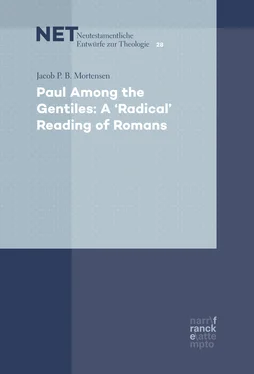Caroline Johnson Hodge is a self-declared radical. In the conclusion of her book If Sons, Then Heirs (2007) she writes:
Like others in the ‘radical’ new perspective, my reading of Paul insists on viewing him as a first-century Jew and thus opens the possibility that he had no critique of Judaism but remained fully faithful to the God of Israel and this God’s plan for the salvation of all peoples. Daniel Boyarin has characterized the Gaston/Gager approach, which my interpretation largely supports…1
What Johnson Hodge presents here is the positive evaluation of Judaism at the time of Paul, of Paul as a faithful Jew in service of the God of Israel, and of the ‘two covenant’ solution as proposed by Lloyd Gaston and John Gager. By confirming these propositions she falls within the main area of the radical perspective. However, her work does not seem to reveal any preoccupation with ideological or interfaith interests.
In her book, Johnson Hodge scrutinizes the perception of the identity of Paul’s addressees from ancient ideological and socio-historical perspectives. Her main hypothesis is that Paul uses the discourse of kinship and ethnicity to construct a myth of origins for Gentile followers of Christ.2 In socio-historical terms, she presents the (possible) core ideology of Paul’s message concerning the new-found identity of his Gentile addressees: Paul relies on the logic of patrilineal descent to create a new lineage for Gentiles as descendants of Abraham through Christ. The identity of the Gentiles relates to, but does not become one with, a Jewish identity. However, ‘being-in-Christ’ is not ethnically neutral, according to Johnson Hodge; it falls under the umbrella of Jewishness. But Gentiles-in-Christ do not become Jews, since Paul continuously calls them Gentiles throughout his letters. Consequently, Johnson Hodge argues that these Gentiles-in-Christ have a mixed or ‘hybrid’ identity, not completely other, but also not identical to their previous status. The reason for this not-ethnically-neutral identity is that Johnson Hodge believes that for Paul, ‘ethnic identity is inextricable from a people’s standing before God’.3 Israel stood as a nation (a collective whole) before God, and so do the Gentiles.
The merits of Johnson Hodge’s interpretation of Paul concern a major point in the reconstruction of Paul’s thought-world: a lucid description of the identity or self-understanding of Paul’s Gentile addressees. Furthermore, Johnson Hodge provides the flip side of the coin – the ideology supporting Paul’s construction of this Gentile identity: the ideology of patrilineal descent. These two elements comprise the received and ascribed identity of Paul’s addressees. Johnson Hodge also provides valuable exegetical interpretations of core passages of Paul’s letters. Specifically, her interpretation of Romans 8, which also furnishes the title of her book, is splendid.
Pamela Eisenbaum presents herself as a Jewish New Testament scholar.1 She studied Theology at Harvard Divinity School and obtained her PhD from Columbia University. In her book, Paul was not a Christian (2009), she clearly declares her alignment with the radical new perspective, and she states her indebtedness to the work of John Gager, Lloyd Gaston, Krister Stendahl, and Stanley Stowers.2 In her book, she argues that Paul may be better understood from a Jewish perspective of covenant theology than from a later Christian perspective. By stating this, she extends and further develops the work of E.P. Sanders and other new perspective scholars. Eisenbaum claims that Paul was not a Christian, because he did not found a new religion in opposition to Judaism. She repudiates the Reformation perception of Paul (justification by faith for all believers) and instead proposes a ‘two way’ solution in Paul.3 Paul ‘lived and died a Jew’ (5), because he was ‘unambiguously Jewish – ethnically, culturally, religiously, morally, and theologically’ (9). Paul did not leave Judaism, but believed that Israel or the Jews are God’s people, and are justified beforehand by living within the covenant relation with God. Israel does not need Christ, because she is already justified by God. The God who justifies Israel called Paul to be apostle to the Gentiles. By being apostle to the Gentiles, Paul brings the Gentiles into the household or family of God, through Christ. Eisenbaum also emphasizes this point: Paul’s mission was limited exclusively to Gentiles. The Torah works for the Jews, and atonement works well within the system of Judaism. But because Gentiles are not part of God’s covenant with Israel and, therefore, do not have the Torah, they need Christ, who expiated their sins for them. She states, ‘To put it boldly, Jesus saves, but he only saves Gentiles’.4 And she further explains, ‘What the Torah does for Jews, Jesus does for Gentiles’.5
Critical evaluation of the radical perspective: T.L. Donaldson and A. Wedderburn
T.L. Donaldson is Professor of New Testament Studies at the University of Toronto, and has written extensively on Paul from a ‘new perspective’ standpoint. In a 2015 article, ‘Paul within Judaism: A Critical Evaluation from a ’New Perspective” Perspective’, Donaldson presented some critical remarks concerning the radical perspective. This article serves as the final outlook or perspective in a presentation of the radical perspective, or the ‘Paul within Judaism’ perspective. Donaldson begins by stating that he actually considers the attempt to situate Paul ‘within Judaism’ as correct. The picture of Paul as an apostle to the Gentiles fits quite well Donaldson’s perception of Paul as concerned with locating his own Judaism within the wider world. And he also considers the terminological aspect important. It does make a difference if we call Paul’s addressees ‘Christians’ or ‘Christ-believing Gentiles’, and if we translate ἐκκλησία as ‘church’ instead of ‘assembly’. However, Donaldson also sees several difficulties with the ‘Paul within Judaism’ project. First, Donaldson addresses some problems with perceiving Jewish eschatological expectations (restoration theology) as the framework of Paul’s mission. According to Donaldson, there was a widespread (albeit not universal) expectation that non-Jews would share in the benefits of Israel’s end-time redemption. However, these Gentile ‘end-time pilgrims’ were not necessarily expected to be categorically differentiated from Jews with respect to Torah observance. Donaldson points out that the contemporary material is ambiguous, and that it does not follow in a simple and straightforward way that, just because there were Jewish expectations of Gentiles joining Israel, that these would remain Gentiles, and not become circumcised and law-abiding Gentiles/proselytes.1 It is not unequivocally apparent that the ancient Jewish authors who wrote on these matters took any great interest in that specific topic. And Donaldson concludes on this observation that it seems odd – if the ancient authors’ attitude was indifferent – that they would infer that non-Jews who had turned to the God of Israel would be forbidden to learn God’s ways as set out in the Torah.
Donaldson turns to another difficulty. This pertains to the question of the logic and sequence of the eschatological events of the end times. According to Donaldson, all material points in the direction of the restoration of Israel bringing about a change of heart among the Gentiles ( e.g. Tob 14:6; 1 En. 90:30–38; Zech 8:20–23; Sib. Or. 3:702–723; Philo Mos. 2.43–44). The inclusion of the Gentiles comes about as a result of the restoration of Israel. However, Donaldson briefly describes the sequence of events as presented by Paul in Rom 11. From this short presentation, it seems as though Paul reverses the logic of the eschatological events in other contemporary Jewish literature: not until the fullness of the Gentiles has come in does the salvation of Israel occur.2 If Donaldson is correct in this description of Paul’s presentation of the sequence of events in the end times, it goes against the logic and sequence presented in the traditional restoration theology at the time of Paul ( e.g. Tobith, 1 Enoch, Zecharia, Sibylline Oracles and Philo). However, Donaldson also concedes that there are places where Paul seems to describe the blessings enjoyed by non-Jewish Christ-believers as derived from blessings that belong, in the first instance, to Jewish Christ-believers (Rom 15:25–27; Rom 11:17–21; Gal 3:13–14). And he also concedes that Paul sees the existence of a Jewish ‘remnant’ as an opportunity to derive his mission to the Gentiles from Jewish patterns of restoration thought. To this critique from Donaldson should be added an answer that Paul was not the first person involved in the Jesus movement. Peter and James were there before Paul. And they did not perceive the consequences of the life, death, and resurrection of Christ in any way having to do with the Gentiles. Paul was probably the first to see this. Consequently, there may be an implied Jewish answer to Donaldson’s criticism of the logic and sequence of events as presented in contemporary restoration theology and in Rom 11, and his criticism should not be considered severe.
Читать дальше












